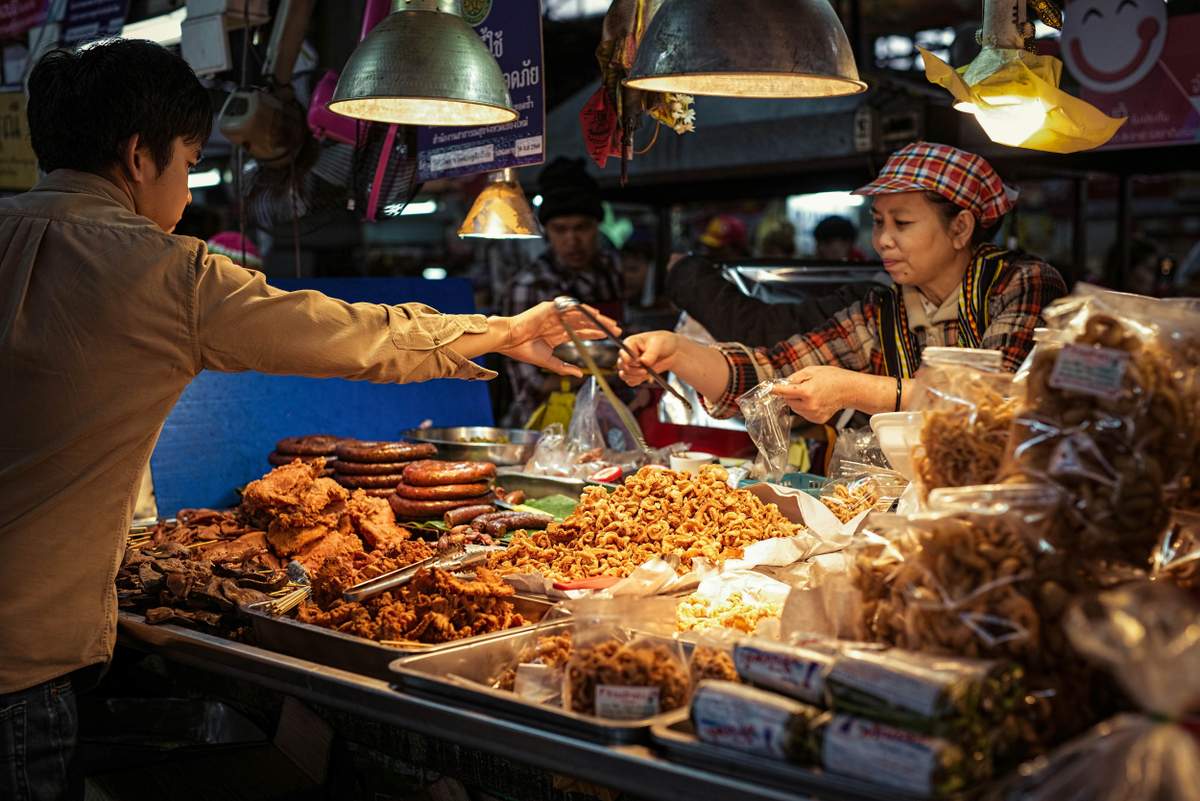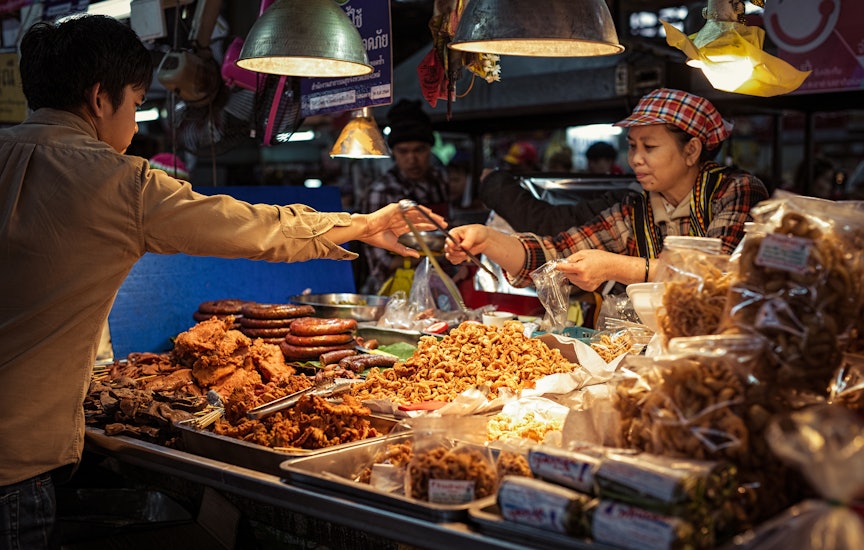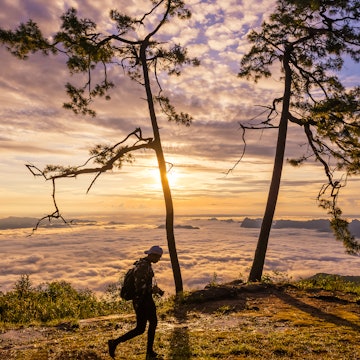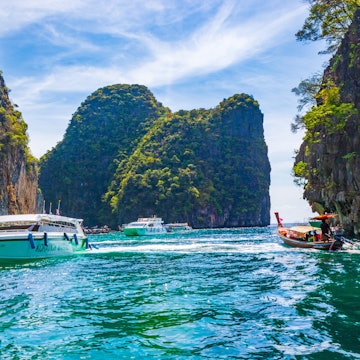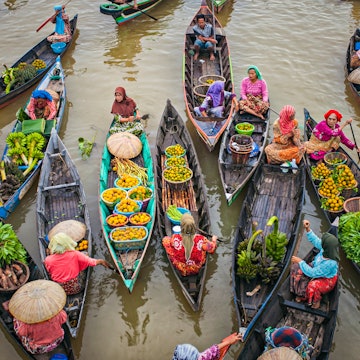

Check how ethical an elephant sanctuary is before visiting. hangingpixels / Shutterstock
Known for its walled historic centre, buzzy university district and green countryside dotted with lush waterfalls, serene wát (temples) and peaceful villages, the northern Thai city of Chiang Mai is a popular place to kick back and recharge the batteries. With more than 10 million travellers now descending upon the city every year, making a conscious effort to tread lightly is essential to protecting its charms. From elephant interactions to temple etiquette, here's how you can support sustainable tourism when you're in the province of Chiang Mai.
Choose elephant activities wisely
With few places left in Thailand where elephants can still be spotted in the wild, many travellers head to Chiang Mai for the opportunity to get up close to pachyderms at an elephant tourism venue. There are now well over 50 of these places within a two-hour drive of the city, but as not all operate in the best interests of elephant welfare, it’s essential to do your research.
It’s now well known that elephant rides can be harmful for elephants, and there's growing evidence to suggest that other interactive activities such as elephant bathing can also be damaging for them – as well as being dangerous for travellers. Consider an observation-only elephant venue such as ChangChill or Burm and Emily’s Elephant Sanctuary.
Look for community-led village visits
Chiang Mai’s proximity to ethnic villages known as hill tribes has seen it become a cultural tourism hotspot. Arguably the best way for your visit to benefit villages is to ensure the tourism experience is community-based, which means the community has control over it. Most villages partner with one or more responsible tour operators to manage the flow of visitors so that the community receives enough tourists to supplement its income without disrupting traditional routines such as farming.
Not all community-based tourism projects in the Chiang Mai area involve hill tribes. Just 30 minutes south of the historic centre, for example, the village of Ban Rai Kong Khing offers a unique type of massage performed with the feet, a sacred Lanna art, which you’d be lucky to find on a spa menu elsewhere in Thailand. Award-winning Thai responsible tourism operator Nutty’s Adventures works with this village along with a range of other community-based tourism projects across the country.
Eat and drink for good
Chiang Mai is home to a number of culinary social enterprise businesses designed to uplift local communities. Start your day with a pick-me-up from Akha Ama Coffee, which has two branches in the city. Named for the ethnic group its founders hail from, the coffee shop serves excellent locally harvested, sustainable, direct-trade beans from the jungles north of Chiang Mai. For brunch, head to Free Bird Cafe, a 1.6km stroll west of the historic centre’s Suan Dok Gate. Known for its all-day breakfast menu and tangy Shan salads, the vegan cafe’s profits support Thai Freedom House, a not-for-profit learning centre for Burmese refugees and Thai minorities.
Don’t leave Chiang Mai without scheduling a dinner at Paak Dang. Set in a Lanna-style teak house perched on the west bank of the Ping River, this smart northern Thai restaurant employs underprivileged youths from neighbouring villages and hill tribes.

Brush up on temple etiquette
Demonstrate your respect for Thai culture when visiting Chiang Mai’s many temples by dressing conservatively (covering your shoulders and knees), refraining from eating, drinking, chewing gum, smoking, or wearing headphones in temple complexes, and removing your hat, sunglasses and shoes when entering worship areas. Do not turn your back close to a Buddha painting or statue (such as posing for a selfie), and avoid touching monks, or taking photos of monks without asking.

Shop with purpose
Before you spend all your baht at the Saturday and Sunday Walking Street markets, consider where and how the souvenirs for sale were produced. Opting for locally made items crafted from sustainable materials is kinder on local people, culture, and the environment.
For ethical textiles and accessories, check out Studio Naenna, which brings together craft makers from various ethnic groups to create high quality, environmentally friendly products, and Sop Moei Arts, which provides a sustainable source of income for Karen villagers in Mae Hong Son Province. Part of a development project for rural communities in Chiang Rai Province, Doi Tung offers a range of local products from handmade clothing to mulberry paper, while the Elephant Parade organisation sells brightly coloured elephant statues and paint-your-own kits as part of its mission to educate visitors about the plight of Thailand’s elephants.
Chiang Mai also has two dedicated zero-waste stores where you can pick up everything from bamboo toothbrushes to ecofriendly shampoo refills: The Normal Shop in the centre of the old town, and My Best Life CNX, which is in the same complex as Free Bird Cafe – don’t forget to bring a reusable bag or container.
Support massage therapists
Make your massage count by opting for a massage centre designed to give staff a leg-up in life. Set up by the former director of Chiang Mai’s Women’s Prison, Lila Thai Massage – which now has eight branches in Chiang Mai – offers post-release employment for graduates from the prison’s massage training programme. The Chiang Mai Women’s Correctional Institute also operates its own massage centre in the historic centre run by former inmates.
Originally launched in Bangkok, Perception Blind Massage, which employs blind and visually impaired therapists, now has an outlet in Chiang Mai. The Thai Massage Conservation Club also employs blind practitioners.
Sleep sustainably
A growing number of Chiang Mai accommodations are now encouraging guests to curb single-use plastic by offering filtered water bottle refills and bulk toiletries, but there are several hotels leading the way with their ecofriendly and socially conscious incentives.
Occupying the beautifully renovated Borneo Trading Company building just east of the Ping River, 137 Pillars House has eliminated single-use plastics, composts its vegetable gardens with treated organic waste, uses reusable woven bags for waste collection, and even called in an expert to learn how to keep mosquitoes at bay without the use of chemical sprays. In the heart of the historic centre, refined Lanna-style hotel Tamarind Village funds three charitable organisations: the Yuvabhadhana children’s scholarship fund; Pan Kan, a second-hand shop that raises money for scholarships; and Food4Good, which sees 1B from every meal ordered at the hotel’s restaurant donated to projects working to feed children in need.
You might also like:
How to choose a sustainable volunteering project
7 soul-satisfying vegetarian and vegan restaurants in Chiang Mai
What to do with kids in Chiang Mai
Sarah Reid travelled to Thailand with support from GLP Films. Lonely Planet contributors do not accept freebies in exchange for positive coverage.






